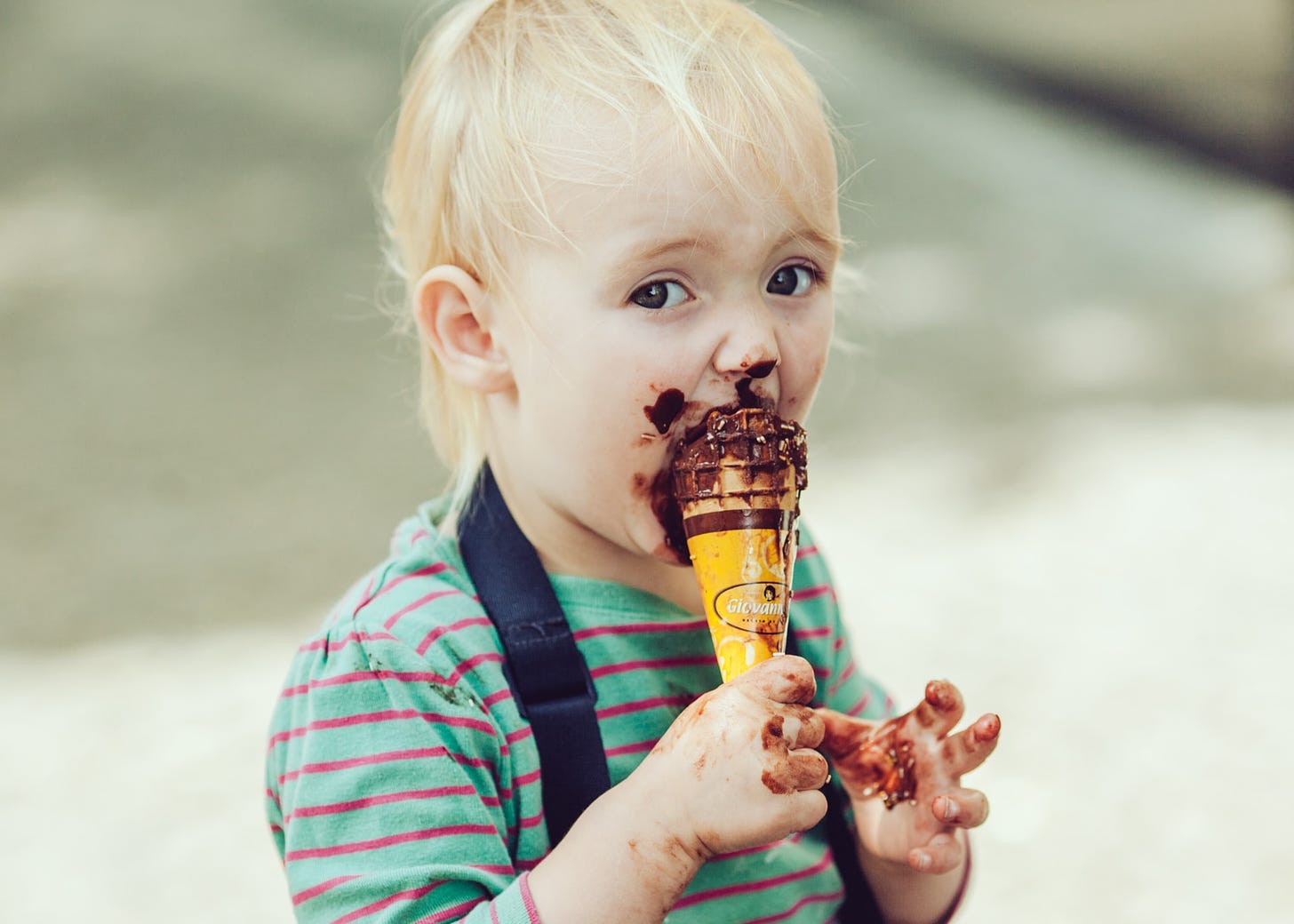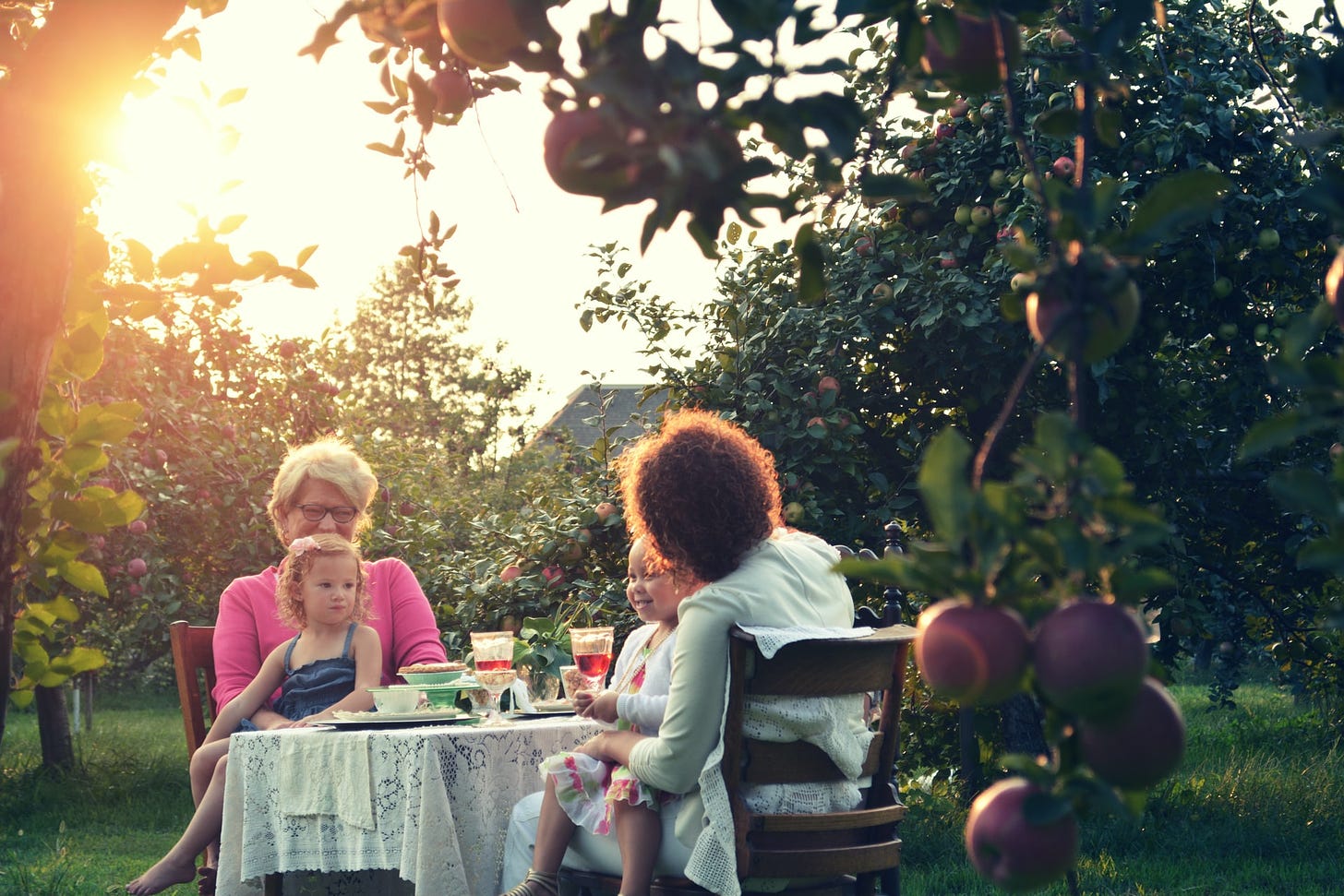Ask Virginia: The Kids Who Don't Eat Enough
We need to think more about how diet culture expectations influence our picky eaters.
Welcome to Burnt Toast, a newsletter from Virginia Sole-Smith, which you can read about here. If you like what you read today, please subscribe and/or share it with someone else who would too.
Got a question you’d like me to tackle about how to feed your kids, combat diet culture, and navigate fatphobia (your own and other people’s)? Hit reply and send it over. (Questions are published anonymously and may be edited or condensed to fit the newsletter format.)
Q: I’m having a struggle that’s very confusing to navigate: I’m a woman in a larger body. And I’m raising a 3.5 year old boy who will not gain weight!
I have been told to add half-and-half to his mac and cheese instead of light milk, coat everything in butter, let him have all the sweets he wants, and have him drink chocolate milk and protein shakes on top of an already ‘beefed up’ menu...Wow, it is a trip. I’m realizing how internalized rules about ‘healthy’ foods and portion control are for me, and how hard it is to shake these habits. I want to throw everything I know out the window and start over for him. But I still end up trying to make myself eat a healthier meal yet being so tempted to finish whatever he hasn’t eaten off his plate. Man, this is tough.
A: This is so tough. I know, very intimately, the fear that comes with having a child who is considered “too small,” or who doesn’t eat. (Note that these two issues are not necessarily related—eating habits do not solely dictate body size! But our culture often presumes one about the other.) If you’re a newcomer, you might know me mostly for how I challenge the “fat is bad” narrative in parenting and in life. But my work in this space started when our older daughter stopped eating as a newborn and spent most of the next two years dependent on a feeding tube. I have danced the dance you’re doing, with the half-and-half and the protein shakes.

And I have also lived the struggle you articulate here, of feeling like you have to feed your child foods that you don’t give yourself full permission to eat. Once, when Violet was about 18 months old, she asked for bacon in front of her dietitian and I apologized—because even though I knew this was a kid who everyone wanted eating bacon, I was still embarrassed to have someone I perceived as a “healthy eating expert” see my child enjoying this “unhealthy” food. I said something like “great, now you’ll think we give her bacon all the time!” And I will be forever grateful for how the dietitian, kindly but firmly, turned to my daughter and said, “Violet, bacon is one of the foods that makes life worth living.”
That moment underscored to me just how completely our ideas about “healthy eating” are defined by anti-fat bias. It wouldn’t feel so alarming to eat bacon, or use so much butter if we weren’t worried about weight. But the definition of “healthy eating” as portion-controlled, low calorie, or only “good” foods belongs to diet culture. Full stop. It’s not “healthy” to deprive yourself of nourishing food to the point that you want to pick the leftovers off your child’s plate. It’s not “healthy” to feed our kids so differently from how we feed ourselves. It’s not “healthy” to apologize for the foods we serve our kids or eat ourselves. And that’s true for all parents, not just thin parents.
So a giant yes to throwing it all out the window and starting over with your son. That’s exactly what we did and 7.5 years later, I’ve never regretted it. We do Front Porch Ice Cream in the summer, bake brownies (and lick the batter) on weekends, and get donuts after Covid tests (a fun new pandemic ritual!). We also make pesto pasta and grow a ton of berries and tomatoes in the garden and have other more “healthy” food rituals—but letting our kids see us enjoying food with them might just be the most important lesson in “healthy eating” we can give them. This shared enjoyment is what communicates to kids that food is safe and pleasurable. And when they see us trusting our own bodies, and not worrying about overeating or eating the wrong things, it’s easy for them to trust their own bodies and approach food from a non-fraught place.

This is especially true for moms, since diet culture messaging around female-presenting bodies is so loud, and for fat parents of all genders. Your mileage may vary, of course, but enjoying food with my kids has been one of the best, and most cathartic tools I’ve found to heal my own relationship with food and body stuff. And that’s something I hear from many a former-dieter parent.
Now let’s talk about the advice you’re getting for your son. I’m not going to get prescriptive here; I’m not a dietitian or a feeding therapist and I don’t know the details of your situation. But I will say: The pressure to feed, feed, feed kids who are happy, healthy, and just happen to be small, feels a lot like the pressure to restrict, restrict, restrict kids who are happy, healthy and just happen to be big. It’s still connecting weight and health. It’s still asking kids to override their internal hunger and fullness cues in order to eat according to someone else’s rules. Now, it is possible to be dangerously underweight in a way that it’s just not possible to be dangerously overweight—true emaciation can be imminently life-threatening. And that’s why feeding tubes are a miracle medical intervention (even while they are also emotionally complicated, horribly invasive, and difficult to live with). But for the majority of slow-gaining kids, who aren’t in such a medically fragile place, I worry about this fixation on growth chart percentiles. The goal is not to get every child to the 50th percentile, but lots of pediatricians approach it that way.
And even if a toddler is medically fragile and on a feeding tube, or close to needing one, I learned by doing that there are ways to approach feeding that honor the child’s sense of body autonomy and encourage them to stay connected to (or rediscover) their hunger, fullness and comfort signals—and there are ways to approach the problem that will absolutely disconnect them further from their bodies. If that’s a distinction you’d like to learn more about, my 2016 article for the NYT Magazine is a good place to start. And if you need more resources, check out Helping Your Child With Extreme Picky Eating, the Mealtime Hostage Facebook Group, and the Tube To Table Podcast.
In Chapter 1 of The Eating Instinct, I wrote:
Recognizing when my ideas about how I should feed my daughter were the product of external pressures helped me navigate the process of teaching her to eat again. I’m not sure I would have learned this if we hadn’t had to start all over, to figure out how to make food feel safe to a traumatized child. I’m not sure I’m done learning it now. Violet taught me that eating well cannot be about following rules; it has to be about trusting our own instincts, which value safety, comfort and pleasure just as much as, and sometimes more, than nutrition.
And that still feels true. We can’t help our kids feel safe around food if we don’t feel safe around food. I hope you can start giving yourself permission to eat what you love.
Also
Go easy on yourself, and others: On Monday, I went on the Brian Lehrer Show on WNYC to discuss how our bodies have changed over the past year—and how we should be grateful to them for helping us survive a global pandemic. Listen here.
Book research: I’m still looking for sources who can speak to weight-based bullying.

(Note: I’m looking for parents whose kids are currently ages 2-19. I love hearing from my child-free readers/older readers! I just can’t use your stories in this project, and due to volume of responses I don’t always have time to respond. But I’m grateful to everyone who shares—it shapes my thinking on these questions more than you know!)
Finally: If you’re looking for “Why Is Getting Dressed So Hard (Part 2)” stick around next week! (And catch up on Part 1 here.)
You’re reading Burnt Toast, a newsletter by Virginia Sole-Smith. Virginia is a feminist writer, and author of The Eating Instinct and the forthcoming Fat Kid Phobia. Comments? Questions? Email Virginia.
If a friend forwarded this to you and you want to subscribe, sign up here:




Whew! As a little girl, I often overate to the point that I became sick because well-meaning relatives talked about how I ate like a little bird and they wanted me to eat more. I still struggle with hunger/fullness signals now.